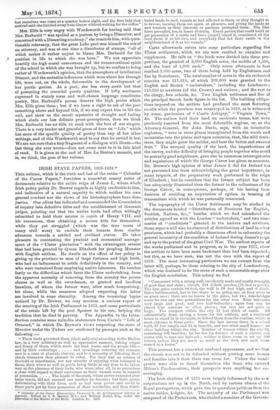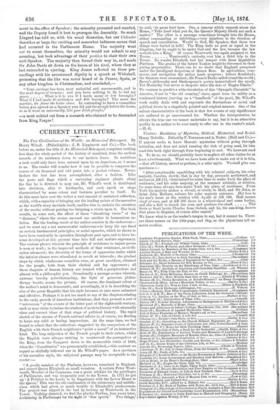IRISH STATE PAPERS, 1603-1624.* The volume, which is the sixth
and last of the entire "Calendar of the Carew Papers," furnishes a somewhat scanty series of documents relative to the entire reign of James I., whose whole Irish policy policy Dr. Brewer regards as highly creditable to him, and indicative of a natural sagacity to which neither his own general conduct nor the views of his historiographers have done justice. Our editor has indicated and commended the Commission of inquiry into defective titles and the establishment of itinerant judges, pointing out that the native lords had often willingly submitted to hold their estates in capite of Henry VIII. and his successors, thus obtaining a secure title for themselves, while they yet struggled (which was the true cause of many civil wars) to exclude their tenants from similar advances towards a settled and civilised status. He takes pleasure in contrasting the prudent and economical manage- ment of the "Ulster plantation" with the extravagant estates that had been granted by Queen Elizabeth for peopling Munster with English settlers. He dwells on the effect of her policy in giving up the province to men of large fortunes and high birth, who had no inducement to settle definitively in the country, and who were restrained from employing native labourers. He touches lastly on the difficulties which beset the Ulster undertaking, from the apparent necessity of removing from the country the poorer
classes as well as the swordsmen, or genteel and landless brawlers, of whom the former were, after much temporising, let alone, while the measures adopted respecting the latter are involved in some obscurity. Among the remaining topics noticed by Dr. Brewer, we may mention a curious report of the meeting of the Irish Parliament in 1613, and some particularls of the estate left by the poet Spenser to his son, belying the tradition that he died in poverty. The Appendix to the Intro- duction contains some valuable statements from Carte's "Life of Ormond," in which Dr. Brewer's views respecting the state of
Munster under the Tudors are confirmed by passages such as the following :—
" These lords governed them (their subjects) according to the Brebon law, in a very arbitrary as well as oppressive manner, taking coigne and livery of them, which made the land waste, and the people idle— and by their cosherings and spendings reducing the common sort to a state of absolute slavery, and to a necessity of following their chiefs whenever they pleased to rebeL For they had no estates of freehold or inheritance, nor any security of enjoying what belonged to them, their wives as well as goods being liable at any time to be taken way at the pleasure of their lords, who were, after all, in as precarious a state with regard to their succession as their vassals were in respect of possession. . . . . The heads of the septa, whose power extended over large tracts, did not succeed one another by descent ; but their power determining with their lives, such as had most power and credit in those parts got by force possession of their territories, and then distri- * Calendar of Ma Carew Manuscripts, Preserved in The Archiepiscopal Library at Lambeth- Edited by .T. S. Brewer, M.A., and William Buller, Esq., under the pireetion of the Master of the Rolls. London, Sc. 1873. bated lands to such vassals as had adhered to them or they thought to to favour, turning them out again at pleasure, and giving the lands to new tenants, as their interests or passions prompted them. The like force prevailed, too, in lessor districts. Every person that could build or get possession a a castle and dawn [court] round it considered all the land about it as his own, and everybody that fed their cattle in the neighbourhood of it as his vassals."
Carte afterwards enters into some particulars regarding the Ulster settlement, which we are now enabled to examine and supplement. He tells us "the lands were divided into three pro- portions, the greatest of 2,000 English acres, the middle of 1,500, and the least of 1,000 each." Only seven allotments in fact reached 3,000 acres, two of these being held by Englishmen and five by Scotchmen. The total number of acres in the six escheated counties was 511,615, of which 209,800 were granted to the English and Scotch "undertakers," including the Londoners ; 110,330 to servitors (of the Crown) and natives ; and the rest to the clergy, free schools, &c. Two English noblemen and five of the principal Scotch lords figure in the list. The building obliga- tions imposed on the settlers had produced the most flattering results when the province was resurveyed in 1619, as is witnessed by some, particulars of " Castle Aubigny," " Virginie Town," &c. The natives held their land on moderate terms, but were prudently removed from the most defensible regions, or, as the Attorney-General, Sir John Davis, says, with an inimitable euphuism, "were in some places transplanted from the woods and mountains into the plains and open countries, that, like wild fruit- trees, they might grow the milder, and bear the better and sweeter fruit." The unequal quality of the land, the imperfections of the survey, and the difficulty of bringing people together who could be mutually good neighbours, gave rise to numerous interrogatories and regulations of which Sir George Carew has given us accounts. Dr. Brewer's high opinion of what James I. did for Ireland has not prevented him from acknowledging the great importance, in many respects, of the preparatory work performed in the reign of Elizabeth ; but he considers that the former subject has been leas adequately illustrated than the former in the collections of Sir George Carew, in consequence, perhaps, of his having been desirous of avoiding an imputation of egoism in treating of transactions with which he was personally connected.
The topography of the Ulster Settlement may be studied in the documents headed "Distribution of Precincts for English, Scottish, Natives, &c.," besides which we find calendared the articles agreed on with the London " undertakers," and two sum- maries of " conditions " granted to the natives and servitors.
Some reports will also be observed of distributions of land in other provinces, which had probably a disastrous effect in enhancing the
general insecurity of the condition or Ireland during James's reign
and up to the period of the great Civil War. The earliest reports of the works performed and in progress, as in the year 1611, sbow the settlers to have been more backward than had been expected ; but this, as we have seen, was not the case with the report of 1619. The most interesting particulars we can extract from the latter will, perhaps, be those relating to the city of Londonderry, which was destined to be the scene of such a memorable siege after the English revolution. This colony we find
"Compassed with a strong wall, excellently made and neatly wrought, of good lime and atone; circuit, 284 2-3rds perches (18 feet to perch). The four gates contain 84 feet, the wall is 24 feet high, and 6 thick. Gates battlemented, but to two there is no going-up ; so they serve to no great uses ; there are no leaves to the gates, but two drawbridges serve for two and two portcullises for the other two. Nine bulwarks very large and good, and two half-bulwarks ; upon four can be placed four cannons or other pieces ; the rest are not quite so large. The rampart within the city 12 foot thick of earth. All substantially done, saving a house for the soldiers, and a continual house to stand in in the night, to defend them from the weather, which is most extreme in these parts. Since the last survey there is a school built, 67 feet length and 25 in breadth, and two other small houses : no other building within the city. Number of houses within the city 92, containing 102 families; far too few for defence of such a circuit. and scarce able to man one bulwark ; neither is there room to set up 100 houses, unless they are made as small as the first, and each room named as a house.'
This account has a somewhat confused appearance, and we fear the circuit was not to be defended without putting more houses and families into it than there was room for. Unless the immi- grants were able to dwarf themselves like those who entered Milton's Pandemonium, their prospects were anything but en- couraging.
The Irish elections of 1613 were largely influenced by the new corporations set up in the North, and by various abuses of the Royal prerogatives, which gave rise to querulous petitions from the native nobles, knights, &c. The majority of the Parliament was composed of the Protestants, who elected a nominee of the Govern-
ment to the office of Speaker ; the minority protested and seceded, and the Deputy found it beet to prorogue the Assembly. So much Lingard has told us, with his usual discretion, but our Calender describes at large the exciting and somewhat ludicrous scenes that had occurred in the Parliament House. The majority went out to count themselves, the minority would not submit to any counting, but took advantage of their position to chair their own anti-Speaker. The majority then forced their way in, and made
Sir John Davis sit down on the knees of his rival, whom they at last succeeded in ejecting. King James reflected on these pro- ceedings with his accustomed dignity in a speech at Whitehall, protesting that the like was never heard of in France, Spain, or any other kingdom in Christendom, and concluded,—
" Your carriage has been most undutiful and unreasonable, and in the next degree of treason ; and you have nothing to fly to but my grace. . . . . . What is it to you if I made many or few boroughs ? What if I had made 40 noblemen and 400 boroughs ? The more the merrier, the fewer the better cheer. In contending to have a committee before you agreed on a Speaker you did put the plough before the horse, so as it went on untowardly, like your Irish ploughs,"
—a most unkind cut from a monarch who claimed to be descended from King Fergus



































 Previous page
Previous page